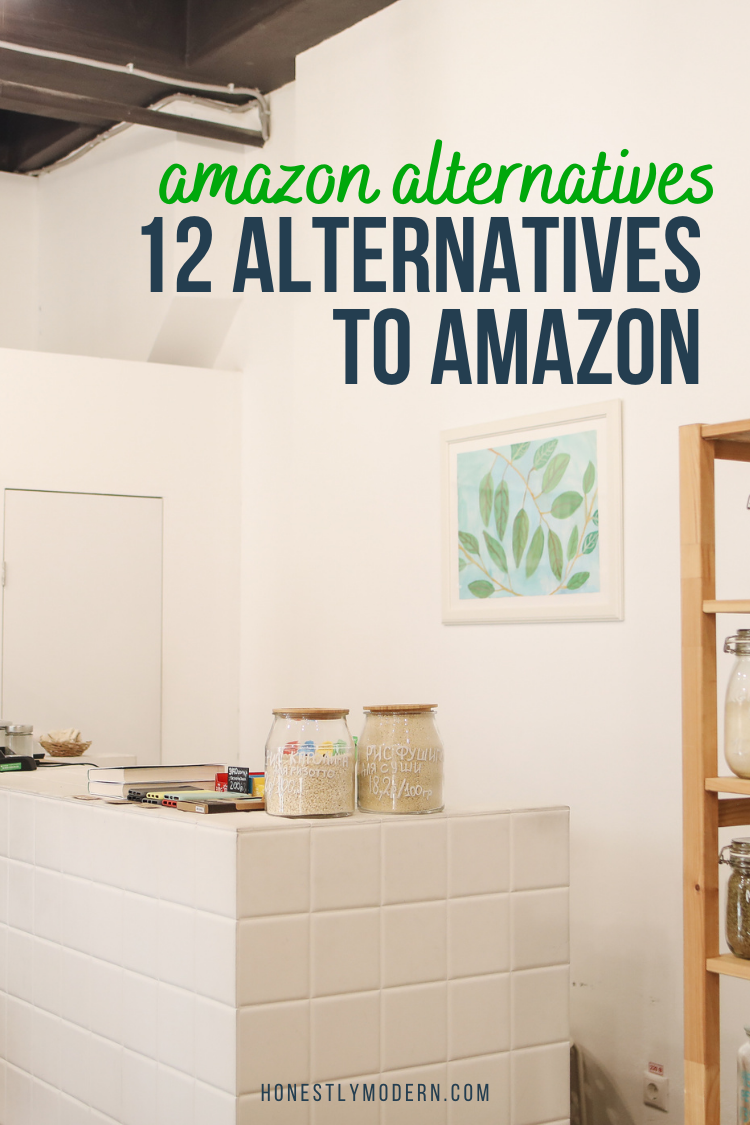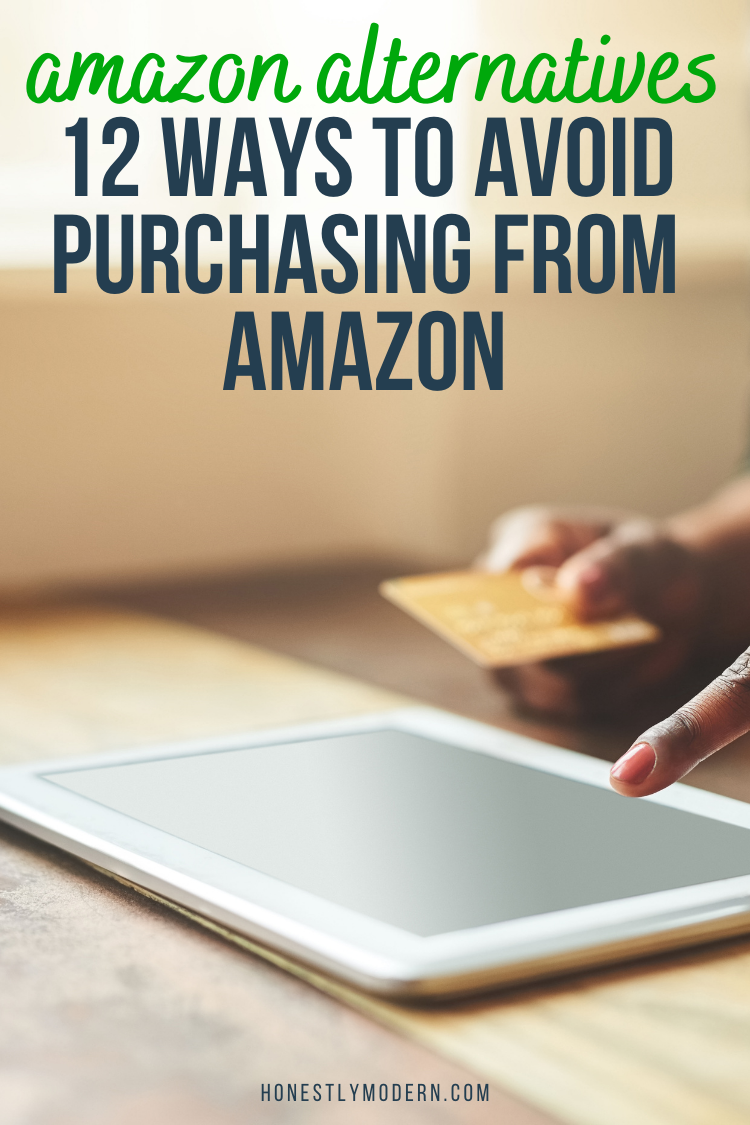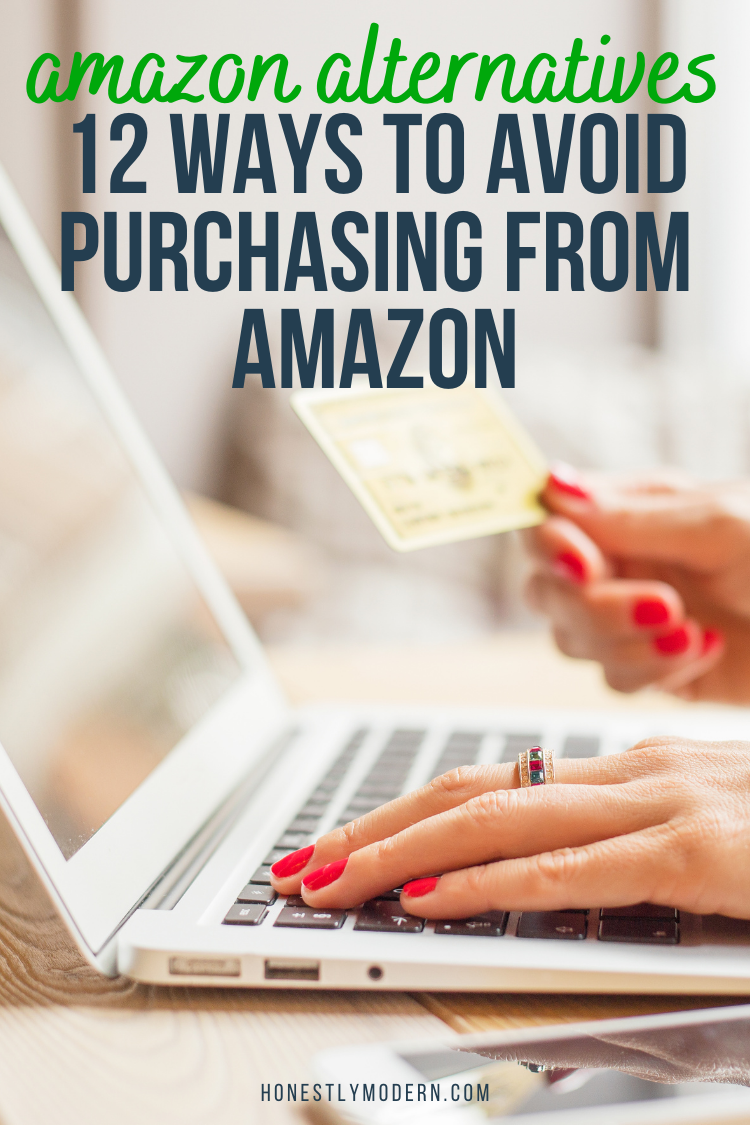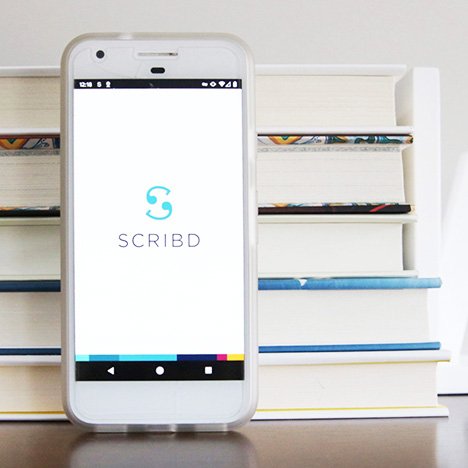12 Amazon Alternatives That Can Also Save You Money
Are you sure you really need what’s in your Amazon cart? Do you think you could find that product elsewhere? Amazon isn’t the most ethical of neighbors, so consider if one of these 12 Amazon alternatives might better serve your needs while also saving you money and helping your local economy.
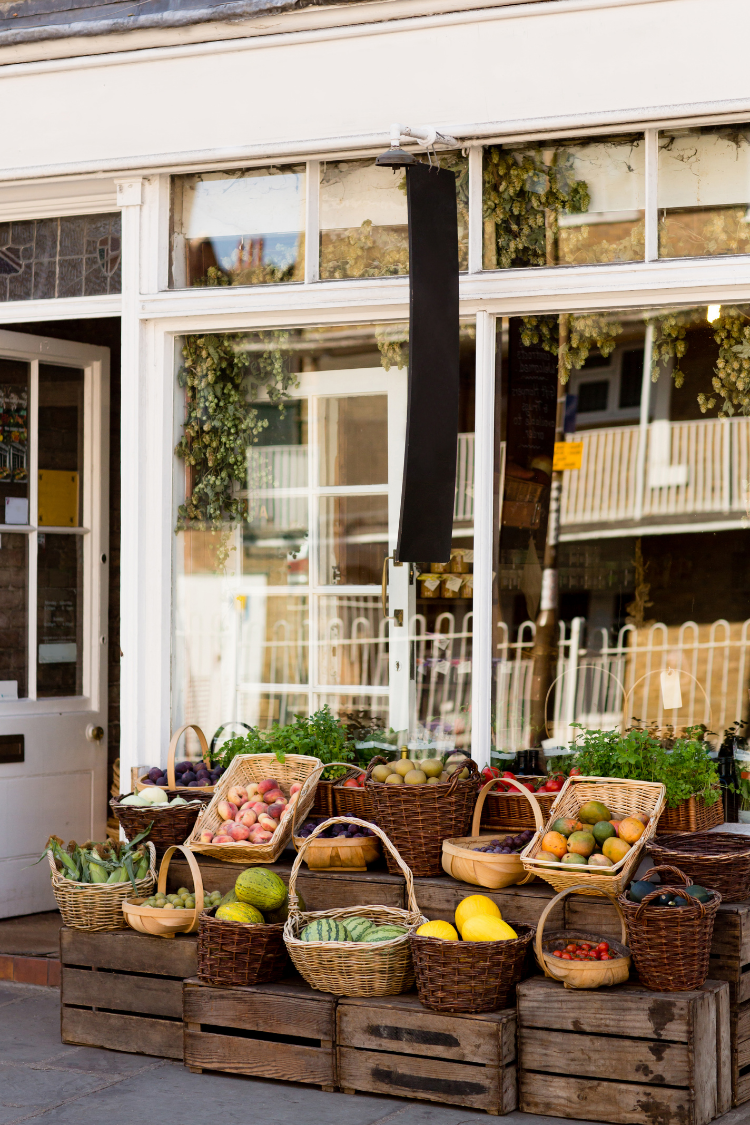
In a few short weeks, our Amazon Prime subscription expires. I do not plan to renew it. We have had an Amazon Prime subscription for many years, and I’ve used it far less often over the last couple of years and especially throughout the last several months.
While the whole world seemed to be ordering all of their essential items from Amazon, we opted for alternative vendors and have made a commitment to avoid Amazon as much as possible.
I shared more about our decision to avoid Amazon a while back, and you can check series of posts about Amazon Alternatives for much more on the issue.
I have quickly found, not surprisingly, that my lack of appreciation for Amazon makes for some uncomfortable conversations with friends. Doesn’t everyone love Amazon?!
I don’t run around denouncing Amazon’s ethics with abandon. But the topic comes up in conversations with friends from time to time, and I tiptoe my way around the discussion, trying not to offend those who receive boxes from Amazon almost daily.
When I mention that I don’t buy from Amazon, most people look at me like I’m a little crazy. Then they follow with the inevitable question of “then where do you buy things?” as if there are no imaginable alternatives.

Amazon Is Relatively New
Even ten years ago, few people used Amazon and even fewer used Amazon religiously like they do today. It’s interesting how quickly we’ve lost sight of the fact that there are literally thousands, if not millions, of other retailers available.
Furthermore, we’ve become so connected to consumption and immediate gratification that we can’t fathom the idea of not meeting every “want” with the click of a button and two-day or 24-hour shipping. We can live without Amazon (and we did it for a long time).
We Are More Than Our Things
Friends… we are so much more than the pretty dress made by slave labor and from polyester (i.e plastic). Amazon fashion sucks anyway.
We are so much more than the present we bring to the party. Didn’t we get invited because of the person we are, not the gift we might bring?
We are so much more than the tchotchke on the wall or the appliance in our kitchen that we use twice a year.
Our consumption culture teaches us to find self-worth in the things we own, and accordingly, we rush to buy ever more to feel ever better.

12 Amazon Alternatives That Can Also Save You Money
Next time you feel the urge to buy something from Amazon, take a second to reflect on what you need and why you need it. Do you really need it? Is there a better way to get it? Can you support a local business or borrow it from a neighbor? Read on for a dozen ways to avoid Amazon, save money, and support your local economy.
1. Just Don’t Buy It
Do you really need it? Is it going to provide that much value? If it’s going to bring you a lot of joy and will be important, it’s probably worth purchasing. However, we often buy things impulsively or without much thought that we don’t use or don’t really need.
Before diving in and buying something that seems like a novel purchase, step back and give yourself some time to consider if you really even need it. So often, we already own something that will work just as well as the shiny new things in our Amazon cart.
2. Find An Alternative You Already Own
Consider if you have something already that will serve the same purpose. It doesn’t have to be exactly ‘the thing’, but in many cases, we have something perfectly suitable. Ignore the impulse to click the Buy Now button from Amazon and save a lot of money and space storing crap you don’t likely need.
Here’s an example. A couple of weeks ago, shortly after buying a new Food Cycler, I decided I wanted a shelf in my kitchen to store the Food Cycler and our Excalibur dehydrator. I didn’t like storing them in our basement and lugging the machines up the stairs each time I wanted to use them.
Immediately, I started envisioning the new corner shelves that would fit in my kitchen and I could purchase from Wayfair, Ikea, or a variety of other brands. Before even opening a website for one of those retailers, I perused Facebook Marketplace to see if anything caught my eye. One set of shelves looked beautiful, but didn’t really fit in the space I envisioned.
Not 30 minutes later, as I walked through my boys’ playroom, which is adjacent to our kitchen, I noticed an empty shelf space on their toy storage shelves. While it might seem odd to store small kitchen appliances in our playroom, it is just a few steps from the kitchen and thus easily accessible anytime I want to use them.
I moved both the Food Cycler and the dehydrator to the playroom and have been pleased with their new homes ever since. Not only did I save myself a couple of hundred dollars by not buying a new shelf, but I also prevented more clutter from coming into our home.
3. Request Items In A Local Buy Nothing Group
If you haven’t looked for your local Buy Nothing group, I recommend searching for one (or starting your own if one doesn’t already exist in your area). Buy Nothing groups are the best. Buy Nothing groups are local gifting groups, managed via Facebook communities or their new Buy Nothing app, through which neighbors gift and receive material items and services from their abundance.
Buy Nothing groups allow users to offer up things they no longer need as well as ask their neighbors for something specific. Before spending money on something you’ve decided you truly need or want for your home or family, ask for it in your Buy Nothing group.
Buy Nothing groups are filled with incredibly generous people who have no problem giving things away or accepting gifts from neighbors to reduce waste, save money, and create a more neighborly and cohesive community.
4. Borrow From A Neighbor
After joining a Buy Nothing group, I became so much more comfortable asking neighbors to borrow things. These days, I have many neighbors from whom I am happy to borrow a tool, kitchen gadget, or another item that I know I can return in great condition.
Just in the last couple of months, I’ve borrowed a cherry pitter, a three-hole punch, a digging tool, a drill, and a slow cooker. We even borrowed our neighbor’s wood chipper to tackle some yard waste building up in our yard. I’m so happy we didn’t have to spend money buying those things that we only would use once or twice.
5. Search Ruckify To Rent Locally
Ruckify is a really neat site that allows people to post items they own for rent. Postings include a variety of things from surfboards and tents to barbecue grills and canning appliances, just as examples. It’s much like Airbnb only people post their gadgets and big toys instead of homes and other real estate properties.
Before buying something like a canning appliance or camping tent that you may only use once or twice, search Ruckify to see if you can borrow something locally. Much like the benefits of a Buy Nothing group or Facebook Marketplace, Ruckify helps reduce consumption and use of virgin resources, saves money, and limits the amount of storage space we might otherwise fill with things that spend most days collecting dust.
6. Search Facebook Marketplace and Other Secondhand Markets
Many things we want to buy will be just as great secondhand as if we purchase them new. I won’t suggest you buy your everyday socks and underwear secondhand, although I’m sure there are some great ones out there. But we can find so many things secondhand that may even be better than when purchased brand new.
Before impulsively adding something to your Amazon cart, check Facebook Marketplace and other secondhand markets. Thredup, The Real Real, and Poshmark are great examples of sites loaded with secondhand fashion. However, you can find plenty of secondhand home goods, supplies, and just about anything under the sun on secondhand sites online or in thrift and consignment shops in your community.
7. Buy Directly From The Brand
Why not buy directly from the brand instead of purchasing through Amazon? Even if you find something on Amazon, it’s often worth noting the vendor. Due to its size and willingness to drop ship items for sellers, Amazon has far too many counterfeit and poor quality knock-off products distributed by third parties. I always look at the seller anytime I find something on Amazon.
Instead of using Amazon as a marketplace, head straight to the brand’s website and buy directly from the brand. You are far more likely to have better customer service and a better return or exchange policy. You also ensure the brand receives the highest margin on the sale and does not have to divert a portion of its profits to Amazon.
You may not receive your product in 48 hours, but reflect on whether you really need the product that quickly. Is immediate receipt worth eating into the brand’s margins in exchange for diverting more money towards a less-than-ethical monstrous company that’s yielding their power across so many aspects of our lives?
8. Search “[item name] Near Me” In Search Engine
Look to find the product at a local store. Using your favorite search engine, search “[item name] Near Me” and see what comes up. You might be surprised that you can support a local business and keep more money in your community with a quick but targeted internet search. I can assure you that small business owners will be much more excited about serving you than Jeff Bezos.
9. Review Search Engine Results Past Amazon Listings & Support Competitors
Search for the product you want using your favorite search engine (Google, Safari, Ecosia, etc..). Most likely, Amazon will be one of the first listings that pop up. In some cases, Amazon products will comprise many of the findings of the first page of search engine results.
Bypass the Amazon listings and see where else you can find the product you need. You may have to scroll through to the second page of the search results, something we don’t often do (at least according to Google’s analytics). But don’t fear the extra ten seconds to skip over Amazon and find another retailer who can provide you the same or better product.
You can also consider big-box alternatives like Walmart and Target. While some of these companies have their own ethical and environmental issues with which to contend, they are probably “less bad” offenders than Amazon. Further, they sustain the competition for Amazon, at least to some extent, in spite of Amazon’s broad horizontal power and influence across industries.
10. Research And Find “Go-To” Brands Outside Amazon For Frequent Purchases
I know we don’t all have time to research multiple options for every product we bring into our home. But particularly for items you buy frequently, those for which you have subscriptions, and large dollar purchases, do a bit of extra research to find “go to” brands other than Amazon.
In these cases, you only need to do the research once to have an ongoing impact as you continue to purchase from or subscribe to this particular brand going forward.
11. Be Willing To Wait
Oftentimes, we don’t need something in 48 hours. If you don’t need it in less than two days, don’t prioritize that aspect of Amazon. If it’s available on Prime, I understand the free shipping is something to consider. But compare the total price, including shipping, to the alternatives, and consider if the speed of shipping really matters relative to when you’ll need the product.
Furthermore, as you shop less from Amazon (and save money spending less impulsively in general), you may find that the Amazon Prime annual fee no longer pays for itself. “Free shipping” with Amazon Prime isn’t actually Free. You’ve simply paid $120 for “pre-paid shipping” for the upcoming year.
12. Use Alternative Marketplaces & Vendors
There are a growing number of marketplace sites similar to Amazon, though smaller, that sell only high-quality and sustainably made goods. They vet brands for you so you can shop all in one place and quickly find ethical alternatives to Amazon without extensive research.
I saved this option for last because, in many cases, products are more expensive or require memberships to access the markets. Many of these options are great for creating new markets for better brands and make it easier for customers to find these brands, but they will also be out of budget for many people.
These markets alone won’t fix our very broken consumption culture, based largely on a misconception that our self-worth is reflected in our possessions. This is precisely the reason a company like Amazon thrives. But these marketplace sites similar to Amazon are a step in the right direction.
We need to buy certain things, and when we do, it’s best to find the highest-quality and most responsible alternative we can afford. But more importantly, we just need to buy less, rent, share, wait, and remind ourselves that we are more than our stuff. We can’t buy self-worth from Amazon or any retailer, even if those impulsive purchases make us feel better temporarily.
If you are in the market for something, and you’ve determined that none of the other options above will suffice, here are a variety of retailers who have vetted brands to ensure they meet sustainable and socially responsible standards.
DoneGood
Forbes called DoneGood “the Amazon for social good”. DoneGood curates products from over 200 brands that are good for people and good for the planet. The market includes clothing, home goods, accessories, self-care products, and a handful of other items for kids and outdoor activities.
DoneGood has a browser plug-in that is really handy. When you shop for certain items, the plug-in will recommend similar alternative products when they find a match. I’ve shared more about DoneGood in the past, and you can check out all the details about DoneGood here.
Etsy
Etsy is great for supporting small businesses with all sorts of items. It used to be best for vintage or handmade goods and accessories, but the offerings on Etsy continue to expand. It’s one of the first places I search when I have something specific in mind but just don’t know where to find it and really don’t want to head to Amazon.
Uncommon Goods
If you’re looking for a unique and interesting gift, Uncommon Goods is a great option. They don’t have a lot of everyday items, but they have some really interesting and niche gift items. The company is a Certified B Corporation and prioritizes sustainable goods and eco-friendly shipping.
Thrive Market
Thrive began as a grocery alternative and has expanded into other products for home and family. Thrive requires a subscription fee (starting at $5/month – half the price of Amazon Prime) to access a market of goods they have vetted as sustainable and eco-friendly (and often healthier) than regular market alternatives. They also have carbon-neutral shipping, warehouses that operate on renewable energy, and more sustainable components of their business model.
Grove Collaborative
Grove Collaborative specializes in all things cleaning along with many other products for your home. The company is a Certified B Corporation and offers lots of products shipped directly to your door to make finding the best home products really easy.
MightyNest
MightyNest prioritizes sustainable products for your home, as the name implies. They offer a variety of items for kitchens and bathrooms, traveling, and health and wellness products. They also offer MightyFix, a monthly subscription through which you receive a unique sustainable-living product each month as well as free shipping on any other purchases from their market. Try the MightyFix for only $3 and get 5 produce bags for your first month with promo code PRODUCEBAGS3.
Tiny Yellow Bungalow
This zero-waste shop, Tiny Yellow Bungalow, started out of (you guessed it) a tiny yellow bungalow. The woman-owned shop stocks a variety of natural and zero waste items to help you lead a more eco-friendly lifestyle. The company has plastic-free packaging and zero waste shipping on all of its orders.
EarthHero
EarthHero offers a variety of products in clothing and accessories, travel products, home products, and more. They also have a specific section dedicated to zero waste items.
Different than most marketplaces, EarthHero has a section dedicated to helping corporations pursue more sustainable alternatives. They provide a variety of their sustainable products with custom branding as well as offer consulting to companies about how to be better stewards of social responsibility through purchasing power.
Simple Switch
Simple Switch offers products in clothing and accessories, coffee, and some other food products, as well as backpacks and travel products. They are a relatively new entrant to the market of helping provide consumers an easier way to find the products they need from the best brands available.
Lastly, I’ve also looked at this list of Amazon Alternatives from The Good Trade and this list of Zero Waste Shops from Going Zero Waste for more ideas. A few of them are duplicates where I had some additional thoughts to share about a company, but they include several other sustainable and ethical marketplaces as well.
While I’m not a giant fan of Amazon (clearly), avoiding Amazon is about more than just the company itself. Amazon’s dominance is a reflection of a greater obsession with consumption and immediate gratification that is destroying our planet and harming our health.
The next time you think about opening your wallet, consider if you really need to spend that money. And if you do, don’t forget that there are so many more ways to get the things we want and need besides impulsive purchasing that arrives at our door in under 48 hours. We can do better!
If You Like Amazon Alternatives, You Might Also Like
6 Reasons Not to Shop Sustainably … Solved!
Have You Joined Your Free Local Buy Nothing Group?
How To Make Money Using Facebook Marketplace
